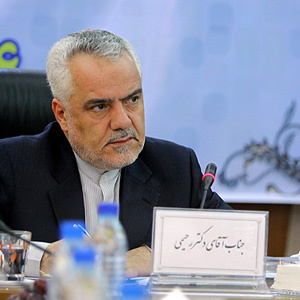Sanctions and Iran’s Economic Mettle

- Vice President Mohammad-Reza Rahimi in the closing ceremony of Tehran’s International Industrial Fair on Saturday
The recent remarks by Vice President Rahimi triggered a new round of debates on the wisdom of the government’s reaction to UN and unilateral sanctions imposed on Iran. Rahimi’s remarks are a sequel to the administration’s claims that the sanctions have no impact and will merely harm the enforcers.
Mohammad-Mahdi Shahriyari, member of Majles’ Committee of National Security and Foreign Policy, has spoken to Iranian Diplomacy about Rahimi’s remarks:
During the three decades after the 1979 Islamic Revolution, Iran has undergone occasional sanctions by the US and some other Western countries, and been deprived of many of its essential needs, particularly in the domain of industry.
Sanctions have, however, become more serious than ever during Ahmadinejad’s administrations and following the UN Security Council-imposed sanctions, particularly the latest one, namely Resolution 1929.
Undoubtedly, these sanctions will cause trouble for Iran’s industries. Countries that have imposed the sanctions are trying to paralyze our industry and the Iranian national economy. Iran’s stamina and speed of development may be deflated due to these sanctions, but considering the potential of our economy, a complete paralysis is absolutely improbable.
Nonetheless, Iran’s potential should not be exaggerated either. Both Iran and Western countries are aware of the limits of the Iranian economy; thus, the “collapse” of France’s economy with a single “frown” by Iran is no closer to reality than a collapse of Iran’s economy is. A person who makes such remarks lacks knowledge of both Iran and France.
Diplomatic etiquette suggests the eschewing of such rhetoric by a high-ranking executive official of a country like Iran, unless we are in a state of hostility or war. And it could do anything but actually serve our national interests. Besides, Iran’s trade exchanges with France are not truly significant— basically limited to Renault and Peugeot imports.
Remarks like those of Mr. Rahimi may be intended to advance Iran’s national interests, but their ramifications are the opposite and threaten our country. Remarks like these encourage the enemy to initiate new scenarios against our national security and interests.
- Vice President Mohammad-Reza Rahimi in the closing ceremony of Tehran’s International Industrial Fair on Saturday
The recent remarks by Vice President Rahimi triggered a new round of debates on the wisdom of the government’s reaction to UN and unilateral sanctions imposed on Iran. Rahimi’s remarks are a sequel to the administration’s claims that the sanctions have no impact and will merely harm the enforcers.
Mohammad-Mahdi Shahriyari, member of Majles’ Committee of National Security and Foreign Policy, has spoken to Iranian Diplomacy about Rahimi’s remarks:
During the three decades after the 1979 Islamic Revolution, Iran has undergone occasional sanctions by the US and some other Western countries, and been deprived of many of its essential needs, particularly in the domain of industry.
Sanctions have, however, become more serious than ever during Ahmadinejad’s administrations and following the UN Security Council-imposed sanctions, particularly the latest one, namely Resolution 1929.
Undoubtedly, these sanctions will cause trouble for Iran’s industries. Countries that have imposed the sanctions are trying to paralyze our industry and the Iranian national economy. Iran’s stamina and speed of development may be deflated due to these sanctions, but considering the potential of our economy, a complete paralysis is absolutely improbable.
Nonetheless, Iran’s potential should not be exaggerated either. Both Iran and Western countries are aware of the limits of the Iranian economy; thus, the “collapse” of France’s economy with a single “frown” by Iran is no closer to reality than a collapse of Iran’s economy is. A person who makes such remarks lacks knowledge of both Iran and France.
Diplomatic etiquette suggests the eschewing of such rhetoric by a high-ranking executive official of a country like Iran, unless we are in a state of hostility or war. And it could do anything but actually serve our national interests. Besides, Iran’s trade exchanges with France are not truly significant— basically limited to Renault and Peugeot imports.
Remarks like those of Mr. Rahimi may be intended to advance Iran’s national interests, but their ramifications are the opposite and threaten our country. Remarks like these encourage the enemy to initiate new scenarios against our national security and interests.

